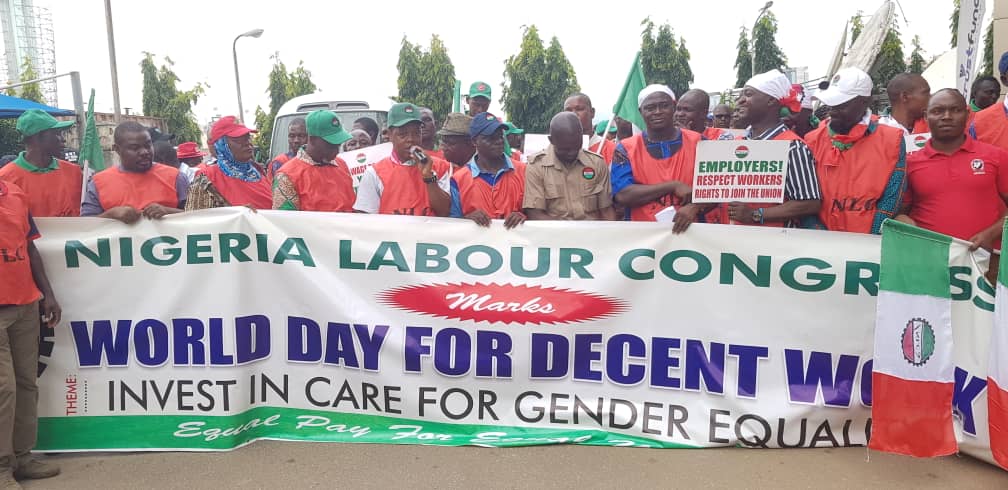Today is International Workers’ Day, or Labour Day for short. Daily Trust joins millions of Nigerian workers and others around the world in celebration of that which makes the world go round: work. Although Labour Day is marked on different days in some countries—the United States, Japan, Canada, Australia and Iran—among them, due in part to the varying histories of the labour movement in each country, it is yet a day for celebrating the same things: the dignity of labour, the historical struggles of the labour movement, and the recognition of work and workers in nation building throughout the world.
For Nigeria in particular, the labour movement has come a long way from the days of Pa Michael Imoudu, whose struggles and leadership, first as President of the Railway Workers Union (RWU) and later of the Trade Union Congress of Nigeria/the Nigeria Trade Union Congress helped laid the foundations not only of our industrial relations to date, but also highlight the roles and contributions of the labour movement to the evolution and development of Nigeria as one nation. That the labour movement in Nigeria was a pillar of the struggles against colonialism and military dictatorship will be forever etched in posterity.
- Train attack: ‘How we contend with our relatives’ absence’
- Huge sums for political party nomination forms
But for this year’s Workers’ Day, we must go beyond the usual parades and fancy speeches by both labour leaders and government officials alike to reflect on the meaning and consequences of the social organization of work and its reward system in Nigerian society today. First, there is a direct connection between work and workers’ welfare on the one hand, and Nigeria’s designation as the poverty capital of the world on the other, with more than 80 million citizens languishing below the national poverty level of just about N382 per day. For many millions of these Nigerians, their poverty is not always on account of unemployment, which is a huge problem enough for Nigeria, but because of low pay.
Nigerian workers earn simply far too low to work themselves out of poverty. For example, Nigeria’s average minimum wage of $98 is less than half of South Africa’s $242, according to 2019 figures compiled by the online database, Statista. Indeed, at N30,000 per month, Nigeria has one of the lowest minimum wages on the continent, even though it is Africa’s largest economy. In such a social and economic setting, the product of work becomes punishment, not reward, and therefore, human dignity, which gainful work helps to uphold in society, is lost. Beyond national parades by unions, a Labour Day such as today requires all to think about these issues too.
And then, there is the casual but gross injustice of unequal pay for the same kind and amount of work for the same employer, particularly the government itself. Nigeians who work for the federal government in one agency receive up to five times more income than other Nigerians who do the same jobs at other federal agencies, even though, as is often the case, both categories of Nigerians must live in the same cities and shop at the same markets. A society steeped in such casual injustice will remain a hotbed of political, economic and social instability. And a Labour Day provides us with the opportunity to reflect on these too.
Our work-reward system is simply skewed in the interest of a favoured few, not those with the best talents or work rate. The deeply entrenched and high levels of corruption in Nigeria, particularly in government, then and now, ensures that some Nigerians receive rewards they could not have worked for even in a million years, and they do so in broad daylight, often with the full awareness and applause of their own communities, religious groups and other social networks they belong. Experts agree that a society in which work is socially organized in this way will fall prey to the kinds of everyday criminality we now witness everywhere in Nigeria today: rampant kidnapping, banditry, corruption and general insecurity of life and property.
But if the Nigerian governments at all levels have not done enough to rescue the country from all of these plagues, it is because workers, too, have not done enough. Nearly all corruption in government and in the public sector is carried with the collaboration of some worker somewhere, particularly the top-level officials who have been entrusted with power to work in the service of the public. And forms of corruption such as employment racketeering and payroll padding are specifically carried out by workers, for government or other employers.
Moreover, many workers routinely fail at their own work. If they don’t arrive work late, they will close early, if they bother to report to work at all. Truancy is the other of the day at many a work place. The values and ethics of work such as commitment to one’s work and one’s organization have all but collapsed. And no doubt, Nigerian society, economy and government all suffer for it. We are indeed what we work.
Thus, while Daily Trust commends all Nigerian workers, and workers everywhere, for their work in the service of the nation and the world, we enjoin all of us to reflect on how the concept and practice of work and reward have changed in this country over the past few decades, and what we all can do to revive them. Happy Labour Day Nigeria.

 Join Daily Trust WhatsApp Community For Quick Access To News and Happenings Around You.
Join Daily Trust WhatsApp Community For Quick Access To News and Happenings Around You.


